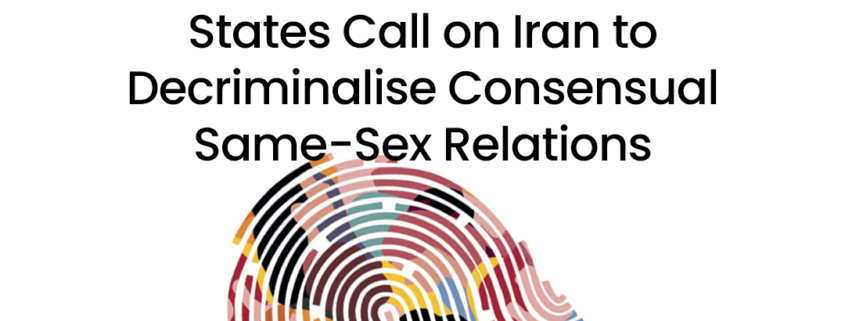More than 10 UN Member States Call on Iran to Decriminalise Consensual Same-Sex Relations

6Rang, 8 November 2019: during the 34th round of Universal Periodic Review, 11 of the several recommendations made to the Islamic Republic of Iran by UN member states exclusively addressed the rights of sexual minorities. In general, these countries asked Iran to end the criminalisation of consensual same-sex conduct between adults and to end discrimination against sexual minorities. These recommendations were made by Germany, Iceland, Canada, Uruguay, the Czech Republic, Israel, Italy, Luxembourg, Mexico, Malta, and New Zealand.
For instance, Iceland recommended that Iran should repeal all the laws that criminalise consensual same-sex conduct between adults, including the imposition of the death penalty and flogging as punishments. In the same vein, another recommendation made by Uruguay asked Iran to end the criminal punishment of consensual same-sex relations between adults.

The Iranian Lesbian and Transgender Network (6Rang) presented a detailed research report and a list of recommendation on SOGIESC issues in Iran during preparatory sessions. 6Rang also held one-on-one meetings with country representatives prior to the third cycle of the UPR in 2019. As a result of this effort, approximately 75 representatives were requested to consider making recommendations on the most pressing SOGIESC issues. Several of these countries then accepted these recommendations and made them to the Islamic Republic of Iran.
During the preparatory session of the UPR, Shadi Amin, the executive director of 6Rang, stated, ‘6Rang highlights four of the most pressing issue amongst many serious issues all of which need attention. These issues are criminalisation, medicalisation, persecution, and the promotion of hate speech by the state of Iran with regard to LGBTI individuals and communities in Iran.’ Following this session, she stated, ‘we are pleased to see that many countries persisted with following up on their previous recommendations, but also that other countries made new recommendations. It shows that member states understand how empowering the international discussion of these issues is for the Iranian LGBTI community, despite the state of Iran not accepting SOGIESC recommendations.’ In the last cycle, 13 recommendations were made to Iran, but Iran did not implement any of them.

The delegate of Iran, headed by Javad Larijani, secretary of the High Council for Human Rights of the Judiciary in Iran, did not respond at all to the recommendations on SOGIESC issues. The research findings carried out by 6Rang points to the fact that in light of Iran’s medical approach to homosexuality, many citizens are forced to seek ‘treatment’ and undergo sex change procedures that are carried out with substandard measures and lack the full and free consent of the recipients. The findings also show that the absence of legal protection against sex reassignment results in obstacles to accessing rights and freedom from violence.
During this UPR session, recommendations also addressed the rights of women, abolition of the death penalty, lack of rights for the Baha’i and other religious minorities, child marriages, juvenile executions, lack of access to the right of defence for the accused, abolition of torture and the rights of ethnic minorities. The Islamic Republic has until April 2020 to announce which recommendations it chooses to accept and implement.


Leave a Reply
Want to join the discussion?Feel free to contribute!